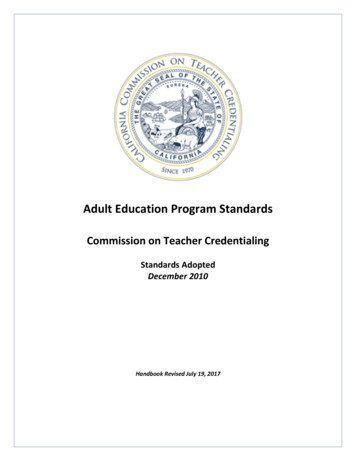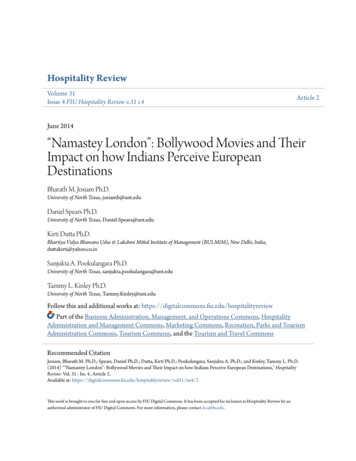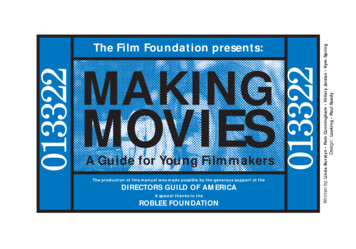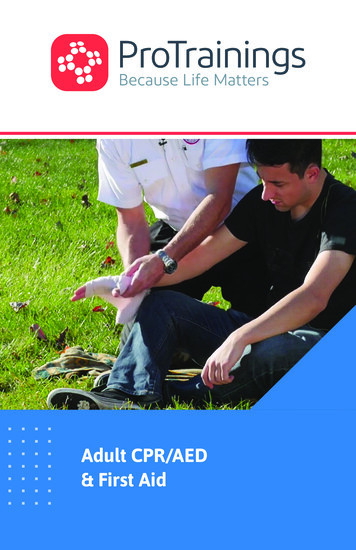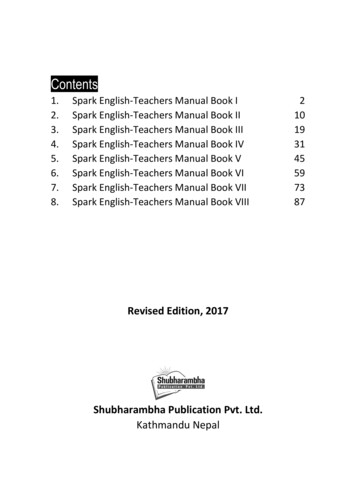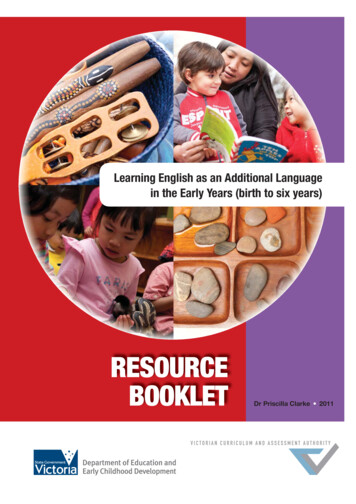
Transcription
ISSN 1799-2591Theory and Practice in Language Studies, Vol. 8, No. 12, pp. 1567-1574, December 2018DOI: http://dx.doi.org/10.17507/tpls.0812.01Learning English through Movies: Adult EnglishLanguage Learners’ PerceptionsWaheeb S. AlbiladiUniversity of Arkansas, Fayetteville, USAFahad H. AbdeenUniversity of Arkansas, Fayetteville, USAFelicia LincolnUniversity of Arkansas, Fayetteville, USAAbstract—The use of media in English teaching and learning has received much attention from educators andsecond/foreign language educators. The use of media includes the use of movies, music, films, and other typesof entertainment-related learning resources. However, little has been done to understand the adult languagelearners’ perceptions toward the benefits and challenges of using English movies to learn English. Thisqualitative research study explored English learners’ perceptions regarding the use of movies as Englishteaching and learning tools. The study focused on what language learners believe are the benefits andchallenges of relying on English movies to develop their language competency. The study’s results indicatedthat language learners believed that movies are authentic sources of language learning and can be usedeffectively to improve language skills including speaking, listening, reading, vocabulary, and writing. Findingsalso revealed that according to language learners, movies are beneficial in terms of increasing students’cultural awareness.Index Terms—ELLs, movies in education, authentic learning, media in language learning, ESL teachingI. INTRODUCTIONOver the past decades, English language has become the most significant and dominant language over the globe(Crystal, 2012). For language learners, learning a new language can be a complex process which requires a hugeamount of time and effort. Second language educators have been using different types of English resources to find themost appealing and effective way of learning the language (Cook, 2016). One way that has been used effectively isencouraging language learners to develop their language competencies through English movies. In fact, much attentionhas been given regarding the effectiveness of using media, specifically English movies, in language teaching andlearning. Proponents of using this type of media believe that movies allow for more interactive and appealing ways ofteaching and learning English (Tafani, 2009). Other researchers (Kusumaningrum, 2016; Sari & Sugandi, 2015) haveargued that watching movies for learning English has some drawbacks because these movies lack instructional andpedagogical intentions.According to Tafani (2009), the use of English movies as an English learning tool should be encouraged andimplemented by language teachers. Many researchers (Ismaili, 2013; Khoshniyat & Dowlatabadi, 2014; Li & Wang,2015; Qiu, 2017) have claimed that there are several advantages inherent in the use of English movies as means todevelop language competency. These benefits include increasing students’ motivation, enhancing students’ oral andcommunication skills, and developing their cultural awareness thereby allowing for a more authentic language learningexperience.Accordingly, Khoshniyat and Dowlatabadi (2014) believe that using English movies can empower ELLs withextensive vocabulary lists, syntax, and other language skills that enable them to improve their English proficiency. Eventhough much research has been done to understand the importance of integrating media into the language classroom andthe language learning experience, little work has been done regarding the effectiveness of watching movies specificallyfor educational purposes. Moreover, little attention was given to explore the perceptions of adult language learnerstoward using movies to develop language skills. Adult language learners should have a voice in terms of how theyperceive watching movies as a learning tool. Thus, the fundamental goal of the present study was to explore adultlanguage learners’ feelings and perceptions about why and how English movies should be used to develop Englishlanguage skills.A. Purpose of the StudyThe purpose of the study was to examine how adult English language learners in the United States perceive theeffectiveness of watching movies to enhance and develop their language proficiencies. Moreover, this study explored 2018 ACADEMY PUBLICATION
1568THEORY AND PRACTICE IN LANGUAGE STUDIESthe benefits as well as the challenges that are usually associated with relying on English movies as English learning andteaching tools. Understanding and exploring these opinions is essential to inform educators and second/foreign languageteachers whether movies can and should be used to learn English. Particularly, the study aimed to provide valuableinformation for adult language learners to start watching movies, not only for entertainment but also for Englishlearning purposes.B. Research QuestionsThe research questions that guided the study were:1. How do language learners describe their experiences using English movies as tools to learn English?2. To what extent do adult language learners believe that watching movies to learn English is beneficial?II. REVIEW OF LITERATUREPrevious studies concerning the use of movies as English teaching and learning tools shed light on the effectiveness,benefits, and challenges that are associated with using English to learn or teach English. Researchers have looked atEnglish movies as effective and interactive ways of learning English.Li and Wang (2015) investigated the impact of using English movies to enhance the English oral skills of Chinesecollege learners. The researchers used English movies as a part of English course to improve students’ speaking andlistening skills. After exposing college students to English movies during English course, the researchers providedstudents with written or oral activities in which they had to summarize or retell the plotlines of the movies. Li and Wang(2015) found that not only students’ oral skills but also their cultural awareness have improved. The researcherscontinued to say that watching movies for educational purposes “enable students to learn the language in a reallanguage environment and find out the cultural differences between Chinese and Western, then students’ motivation canbe aroused, and flexibility in real occasions will be cultivated, therefore, enhancing the ability of foreign languagecommunication and application.” (p. 1100).Similarly, Ismaili (2013) examined the effect of using movies in English as a foreign language (EFL) classroomsamong South East European University students and EFL teachers. With three months period of time, the study tends toexamine the effects of using movies to teach and learn English. The participants of the study included two major groups:teachers and undergraduate students. The first group consists of six teachers who were willing to participate in the study.The second group consists of 60 male and female students with age ranging from 18-25. The participants, preintermediate and intermediate EFL learners, were assigned to experimental and control groups. The researcherintegrated English movies as teaching materials with the treatment group. The control group received more traditionalways of teaching without being exposed to English movies during class time. The results of the study indicated thatthere were significant differences between the two groups with regard to their language proficiency. In other words, theresearcher found that using movies as teaching materials increased students’ motivation and improved their languageskills. Moreover, Ismaili (2013) investigated FL teachers’ perceptions regarding the use of movies as teaching tools.The participant teachers believed that movies can be used effectively to facilitate the learning process, enhance thelearning atmosphere, and encourage more student-teacher and student-student discussions, and that helps in developingELLs language skills.Kusumaningrum (2016) explored the use and potential benefits of incorporating English movies into English asForeign Language classes. The study was conducted in Indonesia where the EFL class is a mandatory learning subjectin senior high school. The main goal of the EFL classes was to raise the academic level of language literacy. Theresearcher used English movies as teaching tools because of the fact that some students did not likely enjoy learning anew language with poor learning style and classroom environment. Therefore, Kusumaningrum’s study was adopted toanswer the questions: How and why English movies can be implemented to teach English as a foreign language tosenior high school students? Kusumaningrum (2016) found that using English movies facilitated the learning processand allowed language learners to develop their language skills, like speaking, writing, and listening in more appealingand interactive ways. The researcher concluded that English movies do indeed provide more opportunity to teach andlearn English in authentic learning environment.Khoshniyat and Dowlatabadi (2014) examined the use of Disney movies to teach English idioms to young IranianEFL learners. The purpose of using Disney movies was to facilitate learning the English idioms and to provide anenjoyable and interesting learning environment. The study included 40 young EFL learners who were divided intoexperimental and control group. The experimental group was exposed to Disney movies to learn English idioms, whilethe control group was exposed to traditional ways of teaching English idioms. Both groups were pre and post-tested toexamine the effects of Disney movies on their acquisition of English idioms. The researchers found that students in theexperimental groups scored significantly higher than the control groups. The study revealed that exposure to moviesallowed students to be much more successful at comprehending and retention of idioms. The researcher concluded bysaying that using movies to teach English could bring imagination to the world of language learning, and that makeslanguage classes more enjoyable and motivating.Qiu (2017) studied the effects of utilizing English movies on listening skills of college language learners. The studyfound that English movies are an effective and beneficial way for improving listening skills of adult language learners. 2018 ACADEMY PUBLICATION
THEORY AND PRACTICE IN LANGUAGE STUDIES1569The study also indicated that English movies increase the authenticity of the learning process and help in decreasingstudents’ learning anxiety. The researcher suggested that English teachers have to consider using English movies todevelop learners’ speaking and listening skills. The researcher concluded by stating that English movies can providesignificant educational reward that make English learning and teaching more authentic and appealing to all languagelearners.To sum up, the review of the literature revealed some academic and social benefits of using English movies to teachand learn English. The researchers indicate that using English movies during language classes is an effective exposureEnglish learning strategy.III. METHODOLOGYA qualitative research method was used to collect and analyze data for this research study. Qualitative researchmethods allow researchers to explore the participants’ perceptions and opinions regarding the use of American moviesto learn English. Moreover, the primary methods of data collection and analysis were interviews. Face-to-face andonline semi-structured interviews were conducted with the participants to understand their opinions and thoughtsregarding the use of movies to learn English. The semi-structured interviews allowed the researchers to deeplyunderstand the participant's perceptions and provide more opportunity to ask questions based on the participants’responses. The semi-structured interview with the participating language learners lasted between 30 to 60 minutes.These interviews were recorded and then transcribed in a word file. The Interview transcriptions were sent to Dedooseto start the coding process.A. Study ParticipantsTo understand the benefits and challenges of using movies as an English learning tool, 25 adult language learnerswere chosen purposefully. The participants were studying at different intensive language programs located in differentstates in the United States. These intensive English programs serve the academic and cultural needs of internationalstudents who were learning English for academic purposes. The participants were studying at different language levelsranging from low-intermediate to advanced language learning. Table 1 provides demographic information about theparticipants and their English proficiency levels:TABLE 1DEMOGRAPHIC INFORMATION OF THE PARTICIPANTSParticipants language anced9Language learners involved in the study differed in their educational background; some of whom were pursuing theirbachelors’ degree while other were starting their master's studies. The ages of the participants ranged from 18-33 andthey came from different ethnic backgrounds, including Hispanic, Arab, and Asian. The study included a mixed gendergroup with ten females and fifteen males.B. Data AnalysisFor the data analysis, the researchers used Dedoose (https://www.dedoose.com) site to organize and analyze thecollected data. Dedoose is an online-based software that helps in coding and analyzing qualitative data. Talanquer (2014)mentioned that Dedoose is a “web-based application that is easily accessible via the Internet and includes the majoranalytical tools present in modern CAQDAS packages.” (p. 85). Talanquer added that the user-friendly interfacefacilitates collaboration among the research team. Ongoing conversations throughout the analysis process helped theresearchers identify initial and final codes and categories that helped in generating themes. Figure 1 represents theanalysis process including the first and second cycle coding as well as the generated themes. 2018 ACADEMY PUBLICATION
1570THEORY AND PRACTICE IN LANGUAGE STUDIESFigure 1. The analysis process including the first and second coding cycle with the generated themes.IV. RESULTS AND FINDINGSAnalysis of data revealed four themes related to adult English language learners’ perceptions toward the use ofEnglish movies as tools to learn English. These themes reflect the participants’ opinions and thoughts of how and whymovies are beneficial in terms of language learning. The following sections will unpack each of these themes in detail.A. Language DevelopmentPrevious research on the use of English movies indicated that movies can be used effectively to improve Englishlearners’ language. Similarly, the language learners participated in this study believed that their language was developedas a result of watching movies regularly. This was mentioned by almost all the participants and is, thus, presented as atheme. This theme suggests that watching movies to learn English played a critical role in developing and improving theparticipants’ English. In particular, participants described four main language skills that can be developed as a result ofwatching movies. These four language skills are: speaking, listening, pronunciation, and vocabulary acquisitions.First, speaking and listening were inextricably connected by participants as an example of their languagedevelopment. Most of the participants believed that watching movies allowed them to improve their speaking andlistening skills. As one learner mentioned, “Since I have been watching movies for a long time, my English languagehas really been improved in speaking and listening.” Another participant mentioned, “I feel that because I have beenwatching movies for a long time, my speaking and listening abilities have really improved.”Second, pronunciation is another language skill that was mentioned consistently by the participants when describingtheir experiences of using movies as learning tools. For instance, one participant stated, “I watch movies, so I can learnsome new vocabulary and their pronunciation. That helps me a lot improving my own pronunciation.” Anotherparticipant felt strongly that movies are the most important source for his pronunciation practice:Besides having fun, I usually watch movies to improve my own pronunciation. I found a really beneficial way topractice my speaking and more importantly my pronunciation skills. I listen to actors and actress pronouncing wordsand then I immediately say the words aloud twice or three times. My pronunciation has improved significantly becauseof this method.Third, the participants were more apt to connect between watching movies and acquiring more vocabulary asevidenced by one participant who mentioned, “Watching movies regularly allows me to know many words that I didn'thave the chance to learn in classes. In movies, these words were used by real people. I saw how these words should beused.” The participants believed that watching movies helps them increase their vocabulary bank, which is an importantaspect of language learning. Interestingly, one participant described movies as “vocabulary gold mine” which includesmany new words from which he can learn. This participant indicated:Movies are the sources of my English learning. Every time I watch a movie, I learn new words which I can use later.I believe that movies are a gold mine that has so many new words which we can use in everyday life. I also think thatmovies should be used in all English classes. They are real and full of new words.Surprisingly, some participants believed that watching movies helps them improve not only their oral but also theirwritten skills through reading subtitles as explained by one of the participants, “watching movies not only improves myspeaking and listening in English, but also my writing has been developed as I was looking at the subtitles that were onmovies.” The following dialogue between one participant and the interviewer explain how watching movies help inimproving the writing skills:[Participant 1] I believe that my writing has improved as a result of watching movies. 2018 ACADEMY PUBLICATION
THEORY AND PRACTICE IN LANGUAGE STUDIES1571[Researcher] How?[Participant 1] When I watch movies, I rely on subtitle to read and understand what is happening. Reading thesesubtitles allowed me to know the spelling of many words. Also, reading the subtitles allowed me to know the structure ofthe sentence.All in all, almost all the participant shared the beliefs that watching movies led to their language development. Theparticipants reported that various language skills, such as speaking, listening, vocabulary acquisition, and writing, wereimproved thanks to watching English movies.B. Authentic LearningAlmost all the adult language learners shared the belief that watching English movies to learn English is beneficialbecause these movies represent real-life language used by native speakers of the language. The participants tended toagree that the language used in movies is life, real, and current, and that makes movies authentic sources of language.According to the language learners, listening to real language represented in the movies makes language learning moreenjoyable and interesting. As stated by one participant, “Movies represents real life situations and events. That’s why Ihave learned many words, idioms, and phrases by watching movies.” Another participant mentioned: “I watch moviesin my spare time to develop my English. That is because the language used is natural and real. I can see how normalpeople talk and used the word and their expressions.” Another student stated:Movies provide learners of English with real situations and the language used in those situations. Learning Englishthrough movies not only provide opportunities to learn from native speakers but also exposes learners to language,which thus contribute to the acquisition of language.Moreover, learning authenticity was expressed by the participants as an advantage of using movies to learn English.The participants believed that exposure to real language increased their motivation to listen carefully and develop theirlanguage. For instance, one participant mentioned:I like watching English movies because they represent real language spoken by real people. It is interesting that youhear language is usually different from what you learn in classes. Real language makes me want to learn more andlisten more to new words and expressions.These findings resonate with Tafani’s (2009) research which emphasizes the ideas of using movies to bring moreauthentic, reality and flexible way of teaching a foreign language. Tafani noted that “While using a film in theclassroom to help our English we have paid attention to the accent, voice, body language, choosing of the words,training ear and the eye, lifestyle, plot idea, summary.” (p.88).Ultimately, the participating adult language learners seemed to agree that authenticity of language learning is one ofthe most significant advantages to be gained from using movies as English learning tools.C. Self-learning/AutonomyAnother emerging theme that explains why adult language learners believe that watching movies helps in learningEnglish is the idea of self-learning. In other words, watching movies helps a student to individualize the languagelearning and making the learning process more appealing and entertaining. The participants mentioned that by watchingmovies, they rely on themselves in understanding and making connections, and that is an important aspect of languagelearning. As one participant stated, “I watch movies every other day, so I can learn English outside my English classes.I can depend on myself to develop my English.”Moreover, some participants saw a connection between watching movies and their abilities to recall or understandnew words. As one participant stated:Sometimes, when my teacher gives us a new vocabulary to study. I found myself knowing the word because of amovie that I watched, especially, if the word is related to Science because I like to watch Si-Fi movies a lot.Interestingly, one participant described learning English through movies as “watching without psychologicalpressure”. These movies, according to the participant, allowed for a more convenient and motivating way of learning.This was clear through some of the participant responses. For instance, one learner mentioned:One thing that I like about watching movies is that I can depend on myself while learning new words or improvingmy language skills. I do not need someone to explain to me or teach me these skills. I think that movies are greatsources of English learning. I am responsible for my own learning.Ultimately, the participants thought that movies increased their autonomy and allowed learning English to be a moreself-oriented process.D. Cultural AwarenessOne of the most surprising findings that emerged from the data was cultural awareness. The participants shared thebeliefs that watching movies increased their cultural awareness and gave them insights on American culture. Theparticipants agreed that culture is an important aspect of English Learning. According to the participating languagelearners, movies serve as a gateway that helps them understand and appreciate the American culture. As one participantstated:when I came to the United States, I had some knowledge about America and the lifestyle here because of the movies.Watching movies was a good way for me to know and understand how people talk, how people interact with each other, 2018 ACADEMY PUBLICATION
1572THEORY AND PRACTICE IN LANGUAGE STUDIEShow people live, and what people usually eat. This, in my opinion, was one of the reasons why I did not have anyproblem adapting to the American culture.Other participants mentioned that by watching Westerns, they were able to get an idea of the Western culture ofAmerica, which is an important part of American history. For example, one student indicated, “I love watching moviesabout the Cowboys. They gave me some historical lessons about America.” Noticeably, one of the participants gave anexample of how being a fan of a Hollywood actress helped her increase her cultural knowledge of the role of women asproductive citizens in the United States. The participants stated:I am a fan of Julia Roberts, my favorite movie of her was the one when she played the character as a lawyer. Ilearned a lot of law terms as well as the role of law here in the US. Also, I had the chance to have clear ideas about therole of women in the American society. This movie was an eye-opening for me in terms of Western culture.All in all, there was an agreement among the participants that learning about American culture is what motivatedthem to watch movies. These movies provide insight into different aspects of culture such as food, traditions, andlifestyle. As one student indicated, “I can say that I learned about American food, clothes, and lifestyle throughwatching movies.”V. DISCUSSIONAccording to the interview results, the participants showed positive opinions toward watching movies to learnEnglish. The results revealed that there seemed to be an agreement on the effectiveness among the participatinglanguage learners regarding watching movies. Significantly, several benefits related to language learning wereidentified by the participants.First, data from this study suggest that movies can be used effectively to develop different language skills such asspeaking, listening, vocabulary acquisition, and writing. The participating language learners were extremely positiveregarding connections between watching movies and their language development. In fact, speaking and listening werementioned by almost all the participants who believed that movies are beneficial sources of developing oral skills. Thisresonates with previous research concerning the importance of using native-like sources to develop oral skills. Horwitz(2008), for instance, argues that listening to English native speakers is one way to develop oral fluency.Another skill that was developed as a result of watching movies is pronunciation, and that is an important aspect ofthe language. In the present study, participants tended to believe that movies helped the learner improve theirpronunciation skills. Gilakjani (2012) points out that pronunciation is one of the most significant aspects of language tobe taught and learned. Learners with good English pronunciation are likely to be understood even if they make errors inother areas, whereas learners with bad pronunciation will not be understood, even if their grammar is perfect. Hence, theparticipants reported that movies are beneficial in terms of developing their language proficiency.Furthermore, the participating language learners seemed to share the idea that movies offer a more realisticrepresentation of the world than traditional language-learning materials, such as textbooks. Hence, watching moviesincreases the authenticity of the learning process. The participants mentioned that learning through authentic situationsincreases their motivation and made watching movies more effective and beneficial with regard to learning English. Theresearch concerning authentic learning revealed several advantages of using authentic sources to learn language. Forinstance, Huang, Tindall and Nisbet (2011) assert that the use of authentic learning materials such as media and movieshas become essential as these materials provide real-life exposure to language for learners. The researchers add thatthese materials enhance the learning environment and make EFL classes engaging and appealing to all students.Likewise, Gilmore (2007) points out that authentic learning helps in decreasing the gap between real language used inreal world and classroom language, and that will ensure more effective language learning.Additionally, besides language development, the study revealed that watching movies increases the culturalawareness of the learners. Culture and language are interrelated skills. Brown (2007) points out that language andculture are parallel and should not be separated when learning English. Brown continues to say: “Language is a part ofa culture, and culture is a part of the language; the two are intricately interwoven so that one cannot separate the twowithout losing the significance of either language or culture.” (pp. 189-190). In terms of using movies or films inEnglish leaning, King (200) indicated that the use of films as tools to teach or learn English allow increase studentsmotivation and cultural awareness. King adds that “as far as student motivation and interest are concerned, entertainingfilms are sometimes enjoyable and relevant to learners' appreciation of popular culture.” (p. 515).Surprisingly, the participants seemed to be aware of the fact that movies cannot be always reliable and effective toolsto learn English. That is because these movies are not designed for learning purposes. The intended audiences of thesemovies are not language learners. This is the main challenge reported by the participants. This lack of pedagogicalintentions also led to some difficulties in understanding some of the vocabulary used in the movies.The participants suggest that in English classes, there should be more time and flexibility to allow movies to be partof the learning and teaching process. When used during language classes, movies increase the authenticity of the classesand make the learning process more enjoyable and motivating.VI. CONCLUSION 2018 ACADEMY PUBLICATION
THEORY AND PRACTICE IN LANGUAGE STUDIES1573This research explored the perceptions of adult language learners toward the use of movies to learn English.Qualitative research methods were used to explore these perceptions. The interviews allowed the researchers
English movies as effective and interactive ways of learning English. Li and Wang (2015) investigated the impact of using English movies to enhance the English oral skills of Chinese college learners. The researchers used English movies as a part of English c


